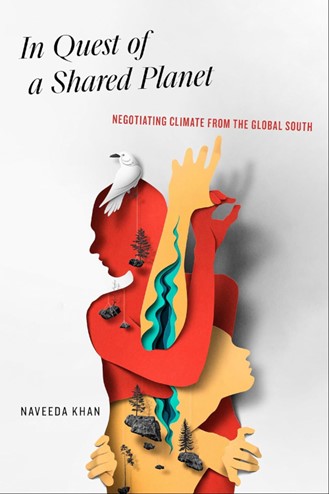Book Review - In Quest of a Shared Planet: Negotiating Climate from the Global South

In Quest of a Shared Planet: Negotiating Climate from the Global South by Naveeda Khan. New York: Fordham University Press, 2023. 227 pp., $90 hardcover 9781531502775, $24.95 paperback 9781531502782
The Twenty-Eighth Conference of the Parties (COP) of the United Nations Framework Convention on Climate Change (UNFCCC) received decidedly mixed reviews from experts, activists, journalists, and even official delegates. On the one hand, unlike the previous twenty-seven COPs, its consensus text, the “First Global Stocktake” of the Paris Agreement, actually mentioned fossil fuels and the parties finally established an international fund for “loss and damage” associated with the adverse effects of climate change. On the other hand, the exact language (tucked away in paragraph 28, point d) recognized the need for “transitioning away from” rather than “phasing out” fossil fuels, and pledges to the loss and damage fund totaled just $782 million—equivalent to the ten-year, $700-million contract Shoehei Ohtani signed with the Los Angeles Dodgers that very week. When the COP’s verb choice regarding fossil fuels circulated, Cedric Schuster, the Samoan chair of the Alliance of Small Island States, labeled the Global Stocktake “our death certificate.” With 2023 shattering temperature records, such assessments sounded less like apocalyptic prophecies than acknowledgements of present realities. Perhaps what is surprising and begs explaining is that thirty years into the UNFCCC process, it still has the capacity to disappoint—which implies it still inspires hope for our shared planetary future.
 Naveeda Khan’s In Quest of a Shared Planet: Negotiating Climate from the Global South shows why eighty-five thousand people participated in COP 28 in Dubai, despite the fact that its president headed the UAE’s state oil company. Khan is an anthropologist, and so her answer is based on participant observation (or “deep hanging out”) at every COP from the twenty-first in Paris in 2015 to the twenty-fifth in Madrid, as well as interviews, textual analysis, and archival research. From this emersion in the process come deeply sympathetic but never romanticized portraits of the people who bring the annual climate party to life: activist-experts and “climate entrepreneurs” such as the late Saleemul Haq, who originally lured Khan from her research on local-Bangladeshi responses to global warming to the Paris meeting; the Filipina activist Tetet Nera-Lauron, who expounds on the details of just financing like a zealous accountant; negotiators such as the Ethiopian delegate Gebru Jember Endalew, who entered the process through his scientific work for the International Panel on Climate Change and served as chair of the Least Developed Country group; and Sebastien Dyuck, a cosmopolitan European lawyer committed to ensuring human rights were not sacrificed to mitigation. We gain first-name familiarity with these and a host of other international civil servants, academics, spiritual leaders, and youth activists. None claim the process will hold global warming below 1.5 degrees. But they aren’t cynical. They keep coming back because the COP has become their vocation, a calling that shapes their identity—as well as a job, party, cathartic outlet, and, as the only global climate negotiation, a forum in which voices from less powerful countries of the global South get an international hearing.
Naveeda Khan’s In Quest of a Shared Planet: Negotiating Climate from the Global South shows why eighty-five thousand people participated in COP 28 in Dubai, despite the fact that its president headed the UAE’s state oil company. Khan is an anthropologist, and so her answer is based on participant observation (or “deep hanging out”) at every COP from the twenty-first in Paris in 2015 to the twenty-fifth in Madrid, as well as interviews, textual analysis, and archival research. From this emersion in the process come deeply sympathetic but never romanticized portraits of the people who bring the annual climate party to life: activist-experts and “climate entrepreneurs” such as the late Saleemul Haq, who originally lured Khan from her research on local-Bangladeshi responses to global warming to the Paris meeting; the Filipina activist Tetet Nera-Lauron, who expounds on the details of just financing like a zealous accountant; negotiators such as the Ethiopian delegate Gebru Jember Endalew, who entered the process through his scientific work for the International Panel on Climate Change and served as chair of the Least Developed Country group; and Sebastien Dyuck, a cosmopolitan European lawyer committed to ensuring human rights were not sacrificed to mitigation. We gain first-name familiarity with these and a host of other international civil servants, academics, spiritual leaders, and youth activists. None claim the process will hold global warming below 1.5 degrees. But they aren’t cynical. They keep coming back because the COP has become their vocation, a calling that shapes their identity—as well as a job, party, cathartic outlet, and, as the only global climate negotiation, a forum in which voices from less powerful countries of the global South get an international hearing.
The reader gains an insider’s perspective on how the UNFCCC process works from the friends Khan makes at successive COPs. As the subtitle suggests, most of her informants represent the global South, although some are experts, activists, or civil servants from the North who provide advice, training, or even official representation for delegations from developing countries. Indeed, identities are fluid: a nongovernmental expert at one COP may be an official delegate at the next, an activist may join the international secretariat, and a national delegate can turn into the chair of a country group with the change of a badge. Khan reveals how the vitality of the bureaucratic process emerges from “politics in-between spaces” (chapter 4)—the bumping together of people and ideas across the porous boundaries separating governmental from nongovernmental, North from South, experts from youth, adaptation from women’s rights. Her anthropological approach is attuned to the ways the process reproduces practices, values, norms, and identities—an international climate community—which is the COP’s principal achievement.
Porous boundaries inevitably risk corruption. Institutions from the global North provide “capacity building,” which is essential for negotiations between parties with unequal technical, diplomatic, and financial resources. The line between cooperation and cooptation can be subtle, however, and for representatives of poor countries, legitimacy depends on authenticity. But what authentic representation looks like varies dramatically between countries and regions. Indeed, one of the monograph’s strengths is mapping the complex web of allied and competing country groups that represent the diverse interests of the “global South.” Some, such as the Group of 77 + China, date to the height of the Cold War; others, like the Small Island Developing States, have specific vulnerabilities to global warming, which puts them at odds with, say, the Arab Group or BASIC (Brazil, South Africa, India, and China); other distinctions, such as between the Least Developed Countries and the Like-Minded Developing Countries require more nuanced contextual analysis. Indeed, rather than any unified position on climate policy, Khan shows that a commitment to Common but Differentiated Responsibilities (CBDR), the UNFCCC’s original core principle, is what unites the diverse, divisive factions of the global South. By differentiating between industrialized countries’ responsibilities for and developing countries’ harms from global warming, CBDR frames climate in terms of international justice and sustainable development.
For poorer countries, climate negotiations should not be preoccupied with carbon emissions. As low-emitting nations, how could they play anything but a marginal role in such negotiations? How would mitigating emissions meet their pressing needs? And why should rich polluting countries need an international treaty to cut emissions? Khan learns to understand mitigation agreements “as a space in which Party positions were protected and commitments minimized, with many loopholes,” so that “formal and informal procedures and forms and norms of negotiation worked to uphold the status quo” (p.70). The process is not a waste of resources, however. Khan’s analysis of the Paris Agreement shows how its Nationally Determined Commitments construct an elaborate accounting system. NDCs cannot compel emissions reductions—and even prioritize economic growth and markets over mitigation and “creaturely existence”—but public accounting supports transparency and accountability, which are vital to the normative “theory of change” implicit in international law (p.111).
The potential of the COP negotiations—and the Paris Agreement’s international accounting—is manifest in activists’ ability to establish “loss and damage” as a core climate issue. From my American perspective, loss and damage inspires hope for reparations for legacies of colonial and capitalist exploitation, but Khan reveals that for the Bangladeshi intellectuals she spotlights, it represents a narrower attempt to hold polluting states liable for harms attributed to emissions since the adoption of the UNFCCC. Either way, the COP process provided the “in-between spaces” in which loss and damage could join mitigation and adaptation as a policy framework for global climate negotiations.
In Quest of a Shared Planet is not a hardnosed comparative analysis of climate policies. It’s a lively ethnography that will help COP participants make sense of their experiences, provides an essential guide for newcomers to the bewildering process, and offers a clear-eyed, nuanced evaluation of the potential of global climate negotiations to contribute to a more just and sustainable future.
Dr. Perrin Selcer is Associate Professor in the Department of History and Program in the Environment at the University of Michigan.


